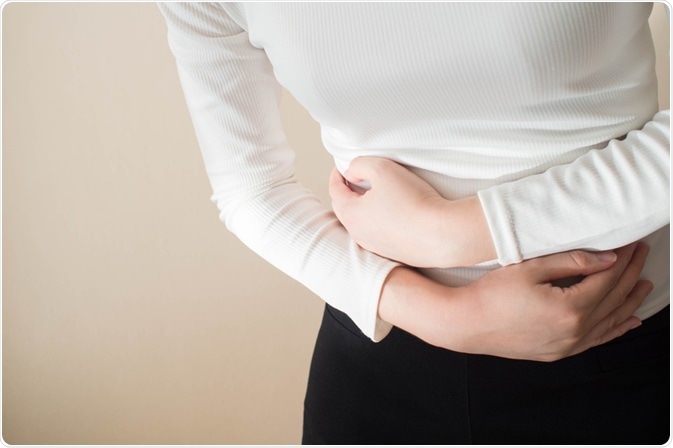Irritable bowel syndrome (IBS) is a chronic gastrointestinal condition that is prevalent in anywhere between 8 and 22 percent of the population. Associated symptoms include abdominal pain, flatulence, changes in bowel habits and bloating, in the absence of organic intestinal disease.

Irritable Bowel Syndrome. Image Credit: Orawan Pattarawimonchai/Shutterstock.com
The cause of IBS has not yet been determined. Genetic predisposition, environmental factors such as infections and psychologic stress, and disorders of colonic digestion absorption and microbial fermentation may be involved in the etiology of the disease.
Microbiota and IBS
It is of interest that the fecal microbiome is obviously abnormal in IBS, with respect to the proportion of facultative organisms, and the reduction in the number of bifidobacteria and lactobacilli.
In some cases, this is caused by bacterial infections, and antibiotics may be useful because they are able to wipe out the disrupting bacterial strains. On the other hand, antibiotics are also the most common cause of this type of microbiome disturbance.
Disruption of the microflora leads to abnormalities in many functions that they perform in the human gut.
Probiotics in IBS
Probiotics are microbes that are ingested in the appropriate numbers in order to bring about health-related effects on the body beyond their nutritive value. These are live organisms and have been studied in many conditions affecting the gastrointestinal tract, such as Clostridium difficile colitis, antibiotic-associated diarrhea, and inflammatory bowel disease. Many studies have now shown that their use is associated with better outcomes in irritable bowel syndrome.
Other applications in which probiotics have been of clinical benefit include necrotizing enterocolitis, traveler’s diarrhea, antibiotic-associated diarrhea, and pouchitis, which is inflammation of a restorative ileal pouch. Probiotics are not a panacea for all inflammatory bowel conditions because they are ineffective in inflammatory bowel disease and Crohn’s disease.
In IBS, probiotics are found to be effective in the general sense, but the available evidence is heterogeneous. Some studies have used single and others multiple probiotics. There is a general improvement in IBS symptoms, but overall, the efficacy is usually confined to one symptom. Research on IBS and probiotics has been confounded by the differences between the parameters used from study to study in terms of dose, strains, duration, formulation, study design, and other treatments used.
Mechanisms of probiotic action
It is now understood that the mucous membrane and microbiome of the intestine are one physiological unit that is of great importance in maintaining intestinal homeostasis, modulating immune responses, and regulating mucosal immunity as well as cytokine production. The benefits brought about by probiotics is best understood in the context of dysbiosis-induced metabolic and inflammatory changes, and include:
- Inhibition of the growth of pathogenic bacteria
- Suppression of pathogen binding via their effects on adhesins
- Improvement of the quality of the epithelial barrier in the gut
- Enhanced host immune activity: some Lactobacillus species enhance immune function, by activation of dendritic cells (DC) which present antigen to the T cells of the innate immune system to produce cell activation and recruitment. This changes the cytokine pattern of the enteric mucosa. They may also be used to deliver other biologically active drugs to the intestine.
- Colonic transit time is also affected by probiotic use in IBS with bloating as a prominent symptom.
Changes in the lumen include:
- Reduced production of gas with fewer Clostridia and Veillonella
- Increased consumption of nutrient substrates in the colon with SCFA production
- Better colon motility, perhaps due to SCFA-induced peristalsis or fluid absorption
- Less bile acid absorption in IBS with diarrhea due to bacterial deconjugation, with a lower load of bile salts to the colon, resulting in less damage to the mucosa
- L. acidophilus leads to the overexpression of opioid and cannabinoid receptors which results in suppression of visceral hypersensitivity that occurs with disrupted gut microflora
Some of these effects are probably mediated by short-chain fatty acids, which acidify the pH and result in bactericidal protein production. One of them is butyrate, which is a nutritive substrate for colonic enterocytes and improves the integrity of the mucosa. They may correct bowel motility problems, and also inhibit epithelial apoptosis.
Commonly used probiotics
One of the most studied probiotics in IBS treatment is Bifidobacterium infantis, which produces reductions in the levels of several pro-inflammatory chemicals such as TNF-α, gamma-interferon, and IL-6. It may also increase tryptophan levels which can suppress abnormal nervous signaling in the gut.
Other species that have been considered in this area and which produce similar effects on the pro-inflammatory (IL-12) and anti-inflammatory (IL-10) cytokine balance include the following strains of Lactobacillus:
- L. Plantarum 299v
- L. rhamnosus LGG
- L. reuteri
- L. acidophilus
- L. casei
There are also Bifidobacterium strains such as:
- B. infantis
- B. lactis
- B. brevis
Another role for probiotics is to act as vehicles for targeted anti-inflammatory therapy at required areas in the gut, such as the use of Lactococcus lactis with the recombinant IL-10 secreting gene, which acted in a manner like that of corticosteroids.
The use of probiotics such as Lactobacilli and Bifidobacteria is safe unless the patient is immunosuppressed, and the dose given is large, or they are used following intestinal resection.
References
Further Reading
Last Updated: Feb 17, 2021